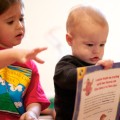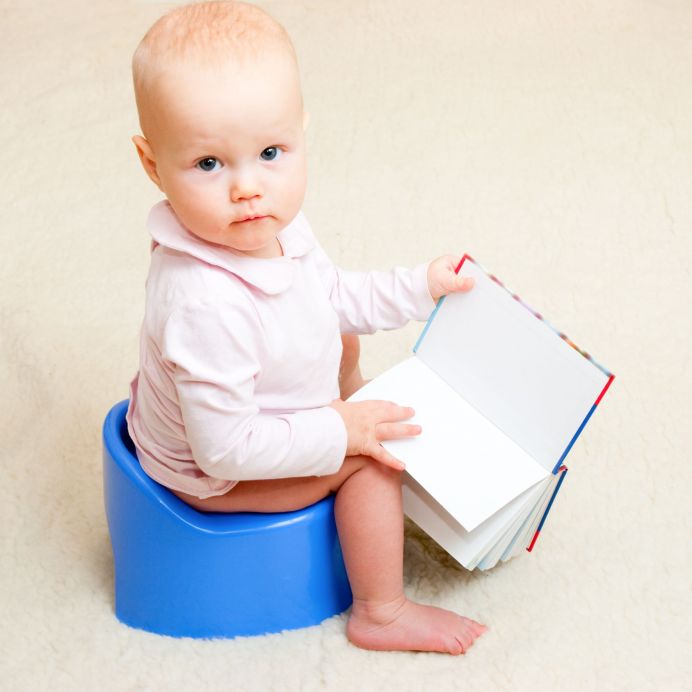My two-year-old daughter still sucks her thumb when she is tired and drifting off to sleep. Lately though, she does it during the day, she’s sucked on a younger child’s pacifier at daycare, and she sucks on a toy pacifier that came with one of her dolls. Is she regressing developmentally? Could the fact that I am pregnant and talking about “the baby” a lot be making her want to do “baby” things?
– Mia
Regressing to earlier developmental behavior, like thumbsucking and bottle or pacifier use, is a very common reaction to the news of a new sibling. (Just like increased beer bottle use is a common reaction to baby news for many first-time dads.)

Research suggests that kids show regressive behavior because of the change that getting a new sibling causes to their daily routine, to their interaction with you or to the level of attention that they get. These subtle changes may feel unfamiliar or threatening to a child – and first-borns feel it the most, because up until now they’ve had parents all to themselves.
But try not to worry about the regressive behavior itself – it’s just an indication that your kid is aware of the changes your family is going through right now. Instead, focus on preparing your daughter for the arrival of the new baby, so that by the time the little spotlight stealer arrives, big sis will be as relaxed and ready to help as possible.
Tips for preparing your daughter before the baby is born:
1. Talk, talk, talk, talk, talk.
Kids understand a lot more than we think – as evidenced by your daughter’s early reaction to the news! So remember to keep her up to speed at every step of the pregnancy, the birth and beyond. Explain that the baby is coming, what being a big sister will be like, what she’ll be doing while you’re in the hospital, what the baby is doing inside your tummy all day…and on and on. (Of course, you might want to leave out the part about how exactly the baby got into your tummy in the first place.)
Explaining things to her will make her feel more at ease because she will know what to expect from all of this new baby craziness. And it will also make her feel like an important, valued member of the family.
2. Read all about it.
There are lots of great books available that can help you explain the new baby transition to your child in a fun way: Waiting for Baby by Harriet Ziefert & Emily Bolam, I’m a Big Sister (or Brother) by Joanna Cole & Rosalinda Kightley, and Oonga Boonga by Frieda Wishinsky & Carol Thompson.
But try to avoid books that focus too much on problems between siblings – jealousy, name-calling, biting the heads off each other’s stuffed animals, etc. – as seeing bad sibling behavior can actually give your children more ideas about how to terrorize each other.
3. Keep the change to a minimum.
Try to get other necessary adjustments, like switching from the crib to a big girl bed and potty training, out of the way at least a few months before the new baby arrives. And avoid framing these changes as things that are happening because of the new baby. You don’t want to encourage feelings of animosity toward the new baby because of how it’s messing everything up.
4. Depend on Dad.
A new baby takes a lot of a mother’s time and resources, so if dad can help pick up the slack and make the older sibling feel special (maybe by cooking breakfast with her, taking her on a special trip to the park, or volunteering to be a round-the-clock human jungle gym), he can really help make the new sibling transition easier for everyone.
Tips for promoting familial bliss after the baby is born:
1. Arrange a hospital visit.
Not seeing Mommy the whole time she’s away at the hospital can make your older child feel isolated and deprived. But studies have shown that going for a special postpartum visit can ease a lot of those problems.
2. Let your daughter lend a hand.
Giving an older sibling supervised opportunities to help with basic baby-related activities like selecting the baby’s outfit or handing the baby a toy can make her feel important and bonded to her younger sibling.
3. Buy your husband a beer.
There’s no research showing that this will actually help anyone with anything after the new baby arrives. But look at the guy. He’s the father of your beautiful, lovable children. Doesn’t he deserve it?





